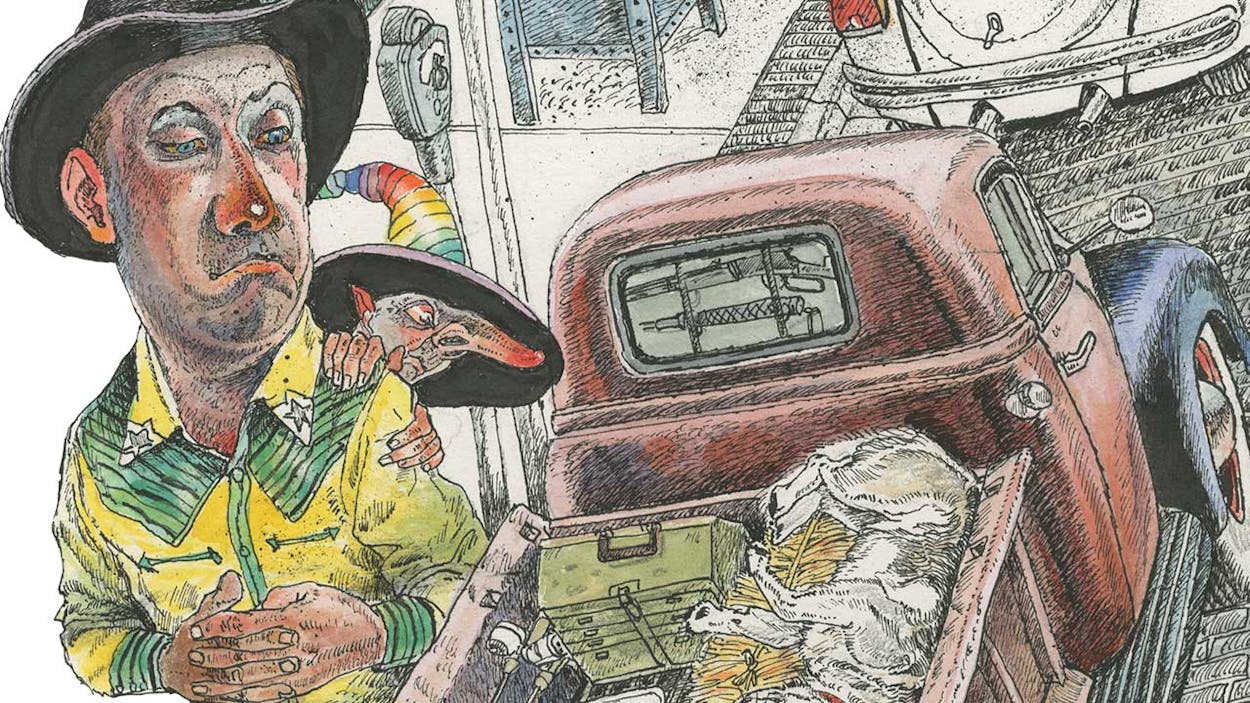Q: In all the years I’ve lived in Texas, I’ve never heard of anyone taking another person’s property out of the open bed of a pickup. I’ve owned three trucks myself, and it seems to me that the pickup is the modern incarnation of a cowboy’s horse. And we know what happened to horse thieves! Is there some law that applies specifically to theft of property from the back of a truck, discouraging such crime?
David K. Phillips, McDade
A: While the pickup is surprisingly not the official state vehicle of Texas (it’s the chuck wagon!), one needn’t rely on the numerous radio and television commercials proclaiming Texas as “Truck Country” to know that Texas is, as the largest truck market in the nation, indeed truck country. Whether you’re puttering down a long dirt road somewhere between Pampa and Perryton, in the Panhandle, or tooling around the paved-over urban centers of Austin, Dallas, Houston, or San Antonio, all you have to do is look around. You’ll see a lot of trucks. And while a great number of these vehicles are driven by city folk who use them to carry golf clubs to and from the course—or, perhaps, to carry an ottoman home from Ikea on a Sunday when they would rather be out on the links with their buddies—there are still many a good ol’ boy (and girl) who more fully utilize the functional capabilities of their pickups. These Texans’ beds are commonly stocked with unsecured shovels, chain saws, mowers, sledgehammers, picks, a goat, bales of hay, saddles, welders, loads of gravel, rusty bailing wire, rubber mud boots, a loyal old dog, a cord of firewood, and other valuable items. Such situations do present an inviting opportunity for the no-good, sticky-fingered scoundrels who roam the streets. And yet you’ve never heard of such heists. And neither are our police blotters cluttered with them. To answer your question, there is no law on the books specific to the theft of a pickup truck’s payload. This is because the sacred space that is the bed of a truck is an area for which the famously unwritten Code of the West and its deterrent-inducing penalties still apply—notionally, at least.
Q: Does anyone ever purchase the super-crazy high-dollar gifts from the Neiman Marcus Christmas catalog?
Petra Carson, Fort Worth
A: The Texanist is one of those gift givers for whom mail-order catalogs are completely useless. The Texanist is a procrastinator. Despite resolution upon resolution upon resolution to change his ways, the magnet-like pull of life’s various distractions (Franklin Barbecue and its famous long line, football season, 254 pretty county courthouse Christmas light displays, etc.) inevitably results in a mad gingerbread-and-eggnog-fueled Christmas Eve gift-buying blitz. Catalog purchases would never arrive at their destinations at this late hour. Hey, something just crossed the Texanist’s mind. Please, if you will, bear with him for a moment longer while he conducts some more introspection. It occurs to him that this is just the sort of flaw that may have caused the ability to afford the likes of the “fantasy gifts” featured in Neiman Marcus’s annual Christmas Book to elude him all these years. Eh, even if the Texanist were a little fatter in the wallet, he’s not sure who on his list would be interested in the $150,000 motorcycle and included ride along the California coast with actor Keanu Reeves (Dangerous Liaisons) from this year’s offerings. Or who would deserve one of the $95,000 Neiman Marcus Limited Edition Ford Mustang convertibles. Or the $90,000 hundred-thousand-foot-elevation “World View Exploration at the Edge of Space” balloon ride. Or the $30,000 Billy Gibbons–designed guitar, to be presented by Gibbons backstage at one of his concerts. But this isn’t about the Texanist’s yet-to-be-made naughty-and-nice list. Ginger Reeder, the kind Neiman’s elf responsible for the fantasy gifts, told the Texanist that each of the outrageous items he just mentioned, despite the fact that it was only October when he reached out to her, had already been purchased. Speaking of fantasies, the Texanist was just thinking, as he was perusing the Christmas Book while mulling your missive, that it would really be something if a mysterious old heiress, acting on a whim, purchased the $125,000 “Orphan Barrel Project” whiskey experience and its 24 bottles of exceptionally rare bourbon from page 38 and had it sent to the Texanist, care of Texas Monthly, P.O. Box 1569, Austin, Texas, 78767-1569.
Q: When my husband and I went to get our marriage license eleven years ago, I had no doubt we were both Texans. He had once told me he was from Vernon and had been born at a nearby Air Force base. Flash forward to marriage license day. “What city and state were you born in?” the clerk asks. “Irving, Texas,” I proudly say. “Altus Air Force Base, Oklahoma,” my fiancé says, glancing my way. I hesitated about ten seconds and then asked why he’d never told me he was not a Texan. “I’ve lived here most of my life,” he proclaimed. The clerk looked a little uncomfortable. And so did my fiancé during those long ten seconds. Being in love and all, I went ahead and married him. But what’s the real truth here? Is he a Texan or is he not a Texan?
Melody (and Tom) Vincent, Little Elm
A: Making an accurate determination regarding the level of Texanness in the man you married is going to require more-detailed information about his backstory. However, if both of his parents were native Texans, residing in Vernon, the birthplace of Roy Orbison, before being shipped off to Altus, Oklahoma, with the Air Force for a spell, and then if, not caring much for Oklahoma, they returned, after their honorable service, to Vernon to raise their boy, the basis for a claim of “natural-born Texan” may exist. Until the matter is settled, you may take comfort in knowing that the “Texan” designation has been bestowed on many a man born outside the state’s physical borders, with the precedent having been set by a great number of our Texan forefathers, who hailed from such faraway places as Virginia (Stephen F. “Father of Texas” Austin), Tennessee (Davy Crockett), and Kentucky (Jim Bowie), to name just a few. Additionally, there’s Connecticut (George W. Bush), New York (Jerry Jeff Walker), Ohio (Roger Staubach), and California (Molly Ivins). If things work out, Altus Air Force Base (Tom Vincent) could get added to this list. Good luck.
Q: What is the secret to solving the golf-tee game (a.k.a. Redneck Rubik’s Cube) at Cracker Barrel?
Steve Rogers, McKinney
A: Before the Texanist, for a variety of reasons, refuses to answer your question, let him first educate those who may not have ever, for a variety of reasons, set foot in a Cracker Barrel Old Country Store and therefore probably don’t have the foggiest idea what you are talking about. Cracker Barrel is a chain of faux-folksy restaurants founded in Lebanon, Tennessee, in 1969, with some fifty outlets across Texas, each one stocked with the triangular variation of an old game known as peg solitaire. The game’s small board has fifteen holes and fourteen pegs (or golf tees in this case). The point is to jump one tee checkers-style and then remove that tee, with the ultimate goal of leaving a single tee on the board. The thrill one gets from damn near solving this maddening brain teaser again and again and again is infuriatingly addictive. But while the Texanist, who, with the help of Cracker Barrel management, kicked his own peg solitaire habit a long time ago, could easily explain how to solve the puzzle, he advises that, instead, you take advantage of Cracker Barrel’s complimentary iced-tea refills; remember the inspirational words of Tom Landry, who once said, “A winner never stops trying”; and soldier on.
The Texanist’s Little-Known Fact of the Month: In the 1978 version of C. W. McCall’s chart-topping novelty song “Convoy,” rerecorded for the Kris Kristofferson movie of the same name, there is a lyric, delivered over citizens band radio, that goes, “By golly, it’s clean clear to Taco Town.” Among truckers and other users of CB slang, “Taco Town” serves as a stand-in for Corpus Christi—a place known for its good tacos.









